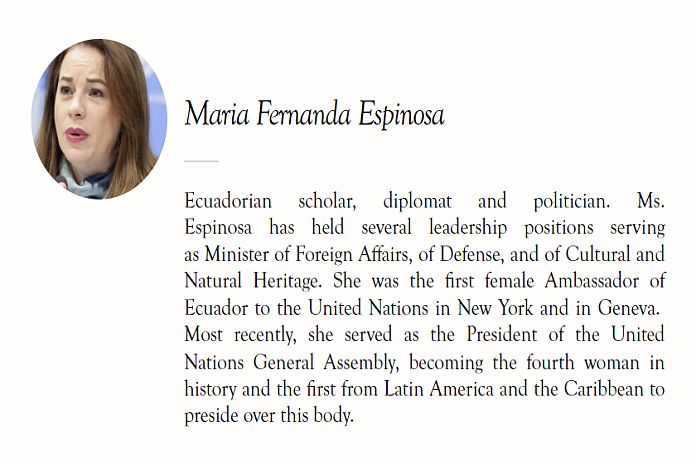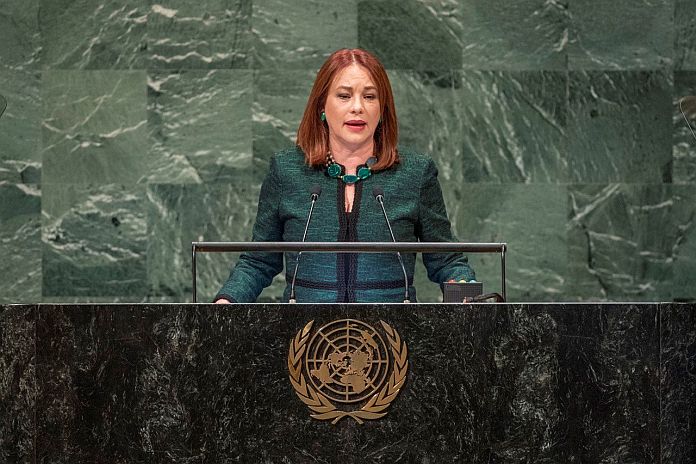Some quick wins are available however, that would set us on the right path. First, rich countries must commit to “doing whatever it takes” to vaccinate the entire planet including easing intellectual property rules at the WTO to allow the manufacture of the vaccines in developing countries … finally, creditor countries should allow developing countries to transfer debt service payments to their health budgets for the duration of the pandemic and offer a plan for extending debt relief to the countries in greatest economic distress.
By Maria Fernanda Espinosa
Eighty years ago, on the same date, January the 6, that rioters invaded the Capital, president Roosevelt addressed Congress on “the simple, basic things that must never be lost sight of in the turmoil and unbelievable complexity of our modern world”. His to-do list has a decidedly modern ring: equality of opportunity for youth and for others, jobs for those who can work, security for those who need it, the ending of special privilege for the few, the preservation of civil liberties for all, the enjoyment of the fruits of scientific progress in a wider and constantly rising standard of living.
Roosevelt’s New Deal did deliver these things for many Americans. But today the agenda has to be global and greener with commensurate international support. Serious reforms are needed to fix the multilateral system Roosevelt helped to build 75 years ago. We also need some quick wins that can ease people’s anxieties in the face of a global pandemic and begin repairing the trust that system will need if it is to address the even bigger challenges ahead.
When I was Ecuador’s ambassador to the United Nations in New York, in 2009, there was real belief that the financial crisis, triggered by the collapse of Lehman Brothers, presented an opportunity to tackle the impending climate crisis.
In April that same year in London, the G20 promised to mobilize financial resources for a “resilient, sustainable, and green recovery”; and in July, the UN General Assembly added its voice to calls for serious international support for “green recovery initiatives”. Those efforts would, we hoped, pave the way for a binding United Nations agreement on climate change mitigation by the end of the year.
It didn’t happen. Without serious money on the table, diplomatic wrangling torpedoed a climate agreement in Copenhagen and the economic recovery stalled the following year as the advanced countries lurched from stimulus to austerity.
A decade later, against the backdrop of a global health pandemic, climate catastrophe looms larger and economic divisions, within and across countries, have widened further. In response to the COVID-19 shock, talk has turned to ‘building back better’. But as we gear up for the climate summit in Glasgow at the end of this year, has the international community learnt the lessons from 2009?
International cooperation is a constant struggle against short-term interests and narrow distributional claims. Over the last decade these centrifugal forces have been in the ascendancy. But there are signs of change. In recent months, the European Union has proposed a Green Deal and acknowledged the importance of a common financing strategy; China has promised to hit net zero emissions before 2060; the new Biden administration has kicked off with a flurry of executive orders that put the fight against climate change at the top of its agenda alongside immediately re-joining the Paris Agreement.
These are all important initiatives but they don’t speak to the immediate anxieties facing the vast majority of the world`s population where the pandemic has pushed poverty levels higher, triggered a massive jobs crisis, and increased inequalities in all its forms, including a strong setback on women’s rights. To date, multilateral efforts to mitigate these adverse effects of the pandemic do not suggest that international cooperation is up to the task.
Vaccines are a clear case of short-term thinking still in the ascendancy. The advanced countries have cornered supply through advanced purchasing agreements, while getting vaccines on time and to scale in developing countries has been treated as a matter of charity rather than global policy. The resulting damage to overstretched health systems in the Global South will be devastating but prolonging the pandemic anywhere will have consequences everywhere; and a recent study by the National Bureau of Economic Research has found that this will ultimately have gravest impacts on advanced economies.
The unsatisfactory global health response is mirrored in the uncoordinated global economic response. Rich countries have spent an average of 20 percent of their GDP on unprecedented cash transfers, alongside business support and job protection schemes. But most developing countries lack the fiscal space and monetary firepower to respond in kind.
The United Nations Conference on Trade and Development, UNCTAD, which speaks for the global South, estimates that lower-income countries are facing a $2.5 trillion financial shortfall – a fraction of what wealthy countries have spent –which can only be filled through international support. But measures so far have fallen far short, leaving developing countries spending $67 million a day on debt payments.
The head of the International Monetary Fund (IMF) has said that there are “win-win-win-win” solutions that are good for nature, incomes, jobs and health. But if the pandemic is seen as a test run of our ability to overcome differences and work together on global challenges, then there is clearly much work to be done.

Some quick wins are available, however, that would set us on the right path.
First, rich countries must commit to “doing whatever it takes” to vaccinate the entire planet including easing intellectual property rules at the WTO to allow the manufacture of the vaccines in developing countries.
Second, the IMF meetings in April should agree to a large allocation of special drawing rights – in excess of a trillion dollars – with the details worked out over the summer ready for roll out in October.
Finally, creditor countries should allow developing countries to transfer debt service payments to their health budgets for the duration of the pandemic and offer a plan for extending debt relief to the countries in greatest economic distress.
Similar measures have been implemented in the past. And putting them in place in time for the opening of the Glasgow Climate Conference would provide the sense of solidarity needed and which so sadly alluded negotiators in Copenhagen. The world simply does not have the luxury of getting it wrong again.
– This article first appeared on VNW La Voce di New York, and is published by special authorization.





